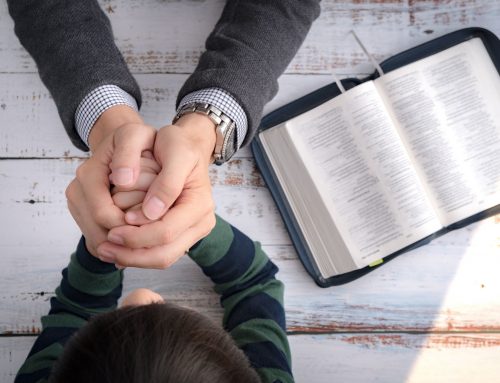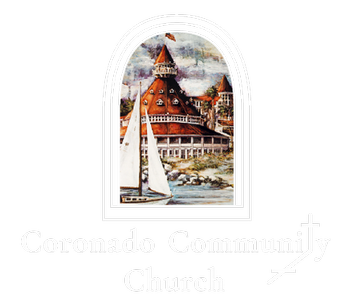Matthew 14:13-21
A sermon by Pastor Eric Smith
August 6, 2023
A sermon by Pastor Eric Smith
August 6, 2023
Let’s start with a story…
As a part of an Italian vacation arranged by a member of his board of Trustees, the headmaster of a very prestigious Catholic school was able not only to have an audience with the Pope but to go on a short boat trip with His Eminence. During the trip, a gust of wind blew the Pope’s white hat off, and the headmaster climbed over the rail, walked across the water, got the hat, and returned it to the Pope.
The Pope was impressed, and when he returned to the Vatican he wrote a note to the school’s board of Trustees, reporting on the event. Some time later, the Pope received this humble reply…
Thank you, Your Eminence, for informing the Board of Trustees that our headmaster is unable to swim.
Our passage today, from the Gospel of Matthew, is a story about Jesus and a miracle. It is Matthew’s telling of the story of the feeding of the five thousand. The same story, right down to the number of baskets filled with leftover bread (that would be 12), is told in all four Gospels. When all four tell the same story it is, clearly, what we call essential Jesus.
Miracle is one those words that is part of our everyday language, and we assume that we mean the same thing when we say it, but it isn’t necessarily so. So let’s clarify… what is a miracle?
As far as grammar goes, miracle is a noun. The definition is…
an effect or extraordinary event in the physical world that surpasses all known human or natural powers and is ascribed to a supernatural cause… or considered as a work of God …
The Bible has a long list of miracles. The Old Testament list is long and the New Testament list is long – so here are a few examples just from the gospels…
- the Star of Bethlehem
- Water turned into wine (John 2:1-11)
- Four thousand fed (Matt 15:32; Mark 8:1)
- Centurion’s servant healed (Matt 8:5; Luke 7:1)
- Peter’s wife’s mother cured (Matt 8:14; Mark 1:30; Luke 4:38)
- A Leper healed (Matt 8:2; Mark 1:40; Luke 5:12)
- Jairus’s daughter raised (Matt 9:23; Mark 5:23; Luke 8:41)
- Man’s withered hand cured (Matt 12:10; Mark 3:1; Luke 6:6)
- A possessed child cured (Matt 17:14; Mark 9:14; Luke 9:37)
- Jesus walks on the water (Matt 14:25; Mark 6:48; John 6:15)
Those are just a few of the miracles in the Gospels.
You and I live with miracles every day. I hear miracle stories from members of the church regularly – but what is interesting is that I hear more miracle stories from folks who are not active church members, because they know that I am a pastor and want to tell me their miracle story. And they tell it conspiratorially … like you’re a pastor… you have to believe me…
I did some reading of stories of miracles. Here is one example…
I was in college and I didn’t have a car at that time. One day I was feeling really sick and decided to go home. I needed to catch the city bus. So when I did I realized that I didn’t have enough money for the bus. So I sat there at the bus stop and waited to figure out what to do and maybe it will all go away. Then while I was sitting there I looked down where I was sitting and I saw a quarter and I picked it up and said to myself wow I only need 15 cents more. So I turn around and there it was… 45 cents more. I had enough to catch the bus and go home. This is my miracle, I’ve always been a true believer of God and this for me was a miracle.
I don’t think we would call this a big miracle – but it was important for someone who was really sick and needed a break and got one.
Here’s another…
I am 13 years old. When I was 9 I had an experience that I haven’t told anyone before. I haven’t told anyone because I thought that no one would believe me.
One night my mum put me and my brother to bed around 8:00. It was a Friday night and we were so tired. At some point through the night I had a very severe asthma attack. I had a chest infection and my mum was very worried because the night before the doctors wouldn’t give me anything more than an inhaler. I went into my parent’s room to get it. But I then realized that I had left it in my own room. I already couldn’t breathe, and I think because I walked a little bit my chest got even tighter, but this time it got so tight that no air could get into my lungs. I collapsed on the floor.
The next thing that happened is something that I will never forget. I opened my eyes and I was in a large room. It was so dark. Then I saw a white light. I looked into the light, and walking out was a woman. I couldn’t see her face but I could see her long blonde hair. She stood there for a few seconds. I was about to say something, but then she interrupted. “It’s not your time yet,” she said.
The voice was so calming, I knew I could trust her. “I want you to close your eyes, and when you open them you will be okay, I promise” I listened. I closed my eyes. Then I could hear my mum shouting my name. I opened my eyes, and I was in an ambulance.
I didn’t say anything to anyone about this experience, it has remained my secret for 4 years. I believe I was given a second chance at life. It was a miracle.
There is no reason to think that these accounts are not true – they were shared by people who had the experience.
Author Frederick Buechner wrote: A cancer inexplicably cured. A voice in a dream. A statue that weeps. A miracle is an event that strengthens faith.
It is possible to look at most miracles and find a rational explanation in terms of natural cause and effect.
It is also possible to look at Rembrandt’s “Supper at Emmaus” and find a rational explanation in terms of paint and canvas.
Faith in God is less apt to proceed from miracles than miracles from faith in God.
Another author wrote that our own presuppositions have the most to do with how we understand the miraculous. Here is what he wrote:
The argument over the possibility of miracles and the effort to define miracle have consumed much time and energy, yet these are secondary questions. The primary question, and in a sense the only real question… is God. If one believes in God, that God creates the universe and sustains it, and controls it, most of the difficulties of miracle have thereby been dealt with.
If you believe in God you will, in some fashion, endorse the possibility of miracles.
The present day challenge comes from great thinkers who have pondered the question over the centuries.
Benedict Spinoza, the great philosopher of the 17th century, was of the opinion that miracles are a violation of natural law. But Spinoza was a believer.
In the 18th Century David Hume took it from there and said that natural law is the proof against miracles – but he also added that faith cannot be based on reason. The conclusion from Hume was that theology must stand outside of logic.
Augustine thought that, while there is order in nature, God can act outside of that order anytime God wants to.
Thomas Aquinas said that miracles are definitely outside of nature – and therefore, are not a violation of nature.
Rene Descartes, who represents the best of modern thinking, said that there are three miracles: creation, freedom of human will, and the Incarnation. These are the three manifestations of God in our realm.
The summary statement is this: what we think of miracles comes from how we define them.
For my own part, I like them. I like miracles. I used to think that endorsing the supernatural just didn’t work for me. I still think that way, sometimes – but miracles are a lot bigger, and more important in our lives than any limitations imposed by my personal biases.
Go with me to the feeding of the 5000 in our scripture passage.
The gathering was reported as 5,000. But that number is too small, that number represented just the men – in those days women and children were not counted. So figure the number was several thousand more than 5000.
That’s a big crowd. Jesus said, see what you have to feed them. The disciples came up with five loaves and two fish. How are we going to feed more than 5000 people with five loaves and two fish?
Jesus said, bring them to me.
Taking the five loaves and the two fish, he looked up to heaven, and blessed and broke the loaves, and gave them to the disciples, and the disciples gave them to the crowds.
… all ate and were filled; and they took up what was left over of the broken pieces, twelve baskets full.
Preachers and scholars have offered two possibilities about what the miracle was. Well… really there are three. The passage does not tell us how the miracle took place – only that all these thousands of people were fed.
The first possibility is that it is all just a metaphor – the Bible often tells us stories that were made up to reveal a great truth. We don’t always know when the Bible is doing that. The metaphorically contained great truth of this story could be that the word of Jesus is enough to feed us all.
The next possibility is that the event was a real event, and that the miracle was that all of those people shared what they had with each other.
There were no convenience stores on the road to the wilderness in those days. No 7-11’s… no circle K’s… no Hadley’s … All of these people knew that… A few might head out into the wilderness carrying nothing to eat with them. Probably not the mothers.
Another factor to consider is that the practice of group sharing was unusual and unlikely – no one of that day would have even considered that thought.
So to have a group of multiple thousands of people sharing food with each other in this way would have been (in historic terms) way bigger than Woodstock. It was a miracle.
The third possibility is that God worked outside of natural law and something you and I have never seen took place. The loaves and fishes were supernaturally and exponentially multiplied.
But this is what is most important about the miracle of this passage. No matter which of these three possibilities is congruent with your beliefs – each of them expresses faith in God – and that is the point of a miracle… encouraging your faith in God.
There is an ebb and flow of our spirituality… maybe it’s better to say our awareness of our spirituality… the more connected we feel with God, the universe, the Spirit… our eyes to see (as Jesus called them) become more sharply focused. Miracles are all around us… all the time… they are expressions of God’s presence with us… and God is always present with us.
So how about your miracle stories? I know you have them. Big ones, little ones, healing miracles, money showing up when you needed it, the right word of hope in a desperate situation, a circumstance that saved your life or someone else’s… it was a miracle.
Tell those stories.
It’s good for you. It’s good for others. It’s good for the church – and God likes to get the credit.
Amen.




